Daily Vocabulary Words: List of Daily Used Words in Leading International Newspapers
Hi there. Welcome to this special section @ Wordpandit.
Our endeavour here is very simple: to highlight important daily vocabulary words, which you would come across in leading newspapers in the country. We have included the following newspapers in our selection:
• The New York Times
• The Washington Post
• Scientific American
• BBC
• The Guardian
• Psychology Today
• Wall Street Journal
• The Economist
We are putting in extensive work for developing your vocabulary. All you have got to do is be regular with this section and check out this post on a daily basis. This is your repository of words that are commonly used and essentially, we are posting a list of daily used words. Hence, this has significant practical application as it teaches you words that are used commonly in leading publications mentioned above.
Visit the website daily to learn words from leading international newspapers.
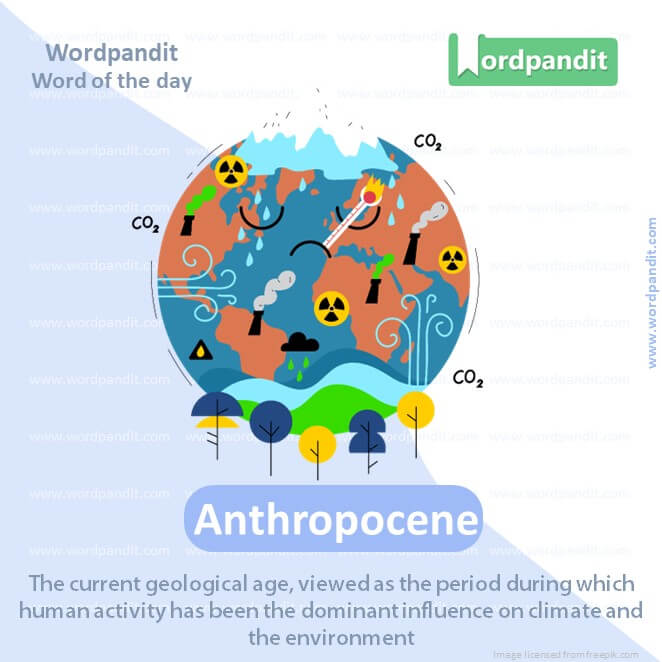
WORD-1: Anthropocene
CONTEXT: Anthropocene now represents the epoch in which humans have become a major force in shaping the environment and the planet. The term was popularized by atmospheric chemist Paul Crutzen at a conference in 2000.
SOURCE: The Times of India
EXPLANATORY PARAGRAPH: Imagine the whole time our world has been around as a big storybook. Each chapter is about a different time when certain things were happening on Earth. The Anthropocene is the name of the chapter we are in now, where people, like you and me, are having a big effect on our planet.
MEANING: The current geological age, viewed as the period during which human activity has been the dominant influence on climate and the environment (noun).
PRONUNCIATION: An-thro-po-scene
SYNONYMS: Epoch, Age, Era, Period, Phase, Time-span, Duration.
USAGE EXAMPLES:
1. Scientists argue that we are now living in the Anthropocene era.
2. The impact of plastics in the ocean is a defining feature of the Anthropocene.
3. The Anthropocene represents a new phase in Earth’s history.
4. Pollution and global warming are major concerns of the Anthropocene.
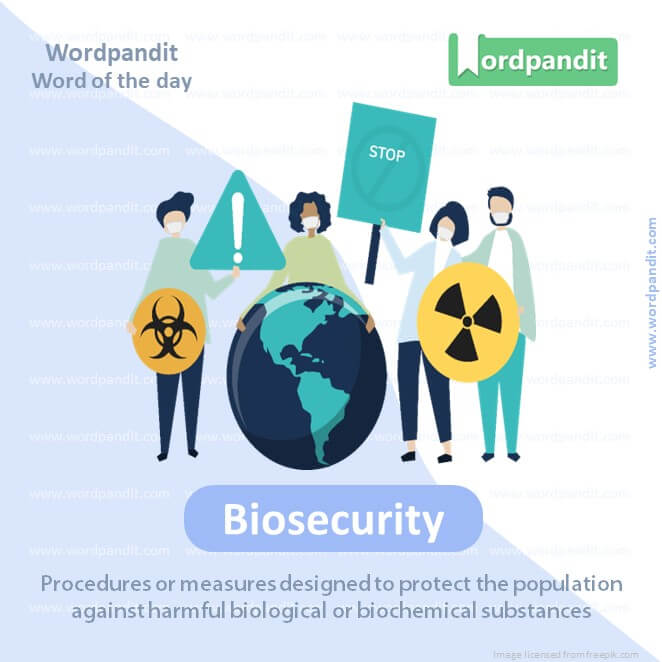
WORD-2: Biosecurity
CONTEXT: Biosecurity is becoming an increasing concern in India, especially in the wake of the recent pandemic. Measures are being implemented to safeguard the population from biological threats.
SOURCE: The Economic Times
EXPLANATORY PARAGRAPH: Biosecurity is like a safety rulebook for plants and animals. It helps keep them safe from diseases and pests that can hurt them.
MEANING: Procedures or measures designed to protect the population against harmful biological or biochemical substances (noun).
PRONUNCIATION: Bio-se-cu-ri-ty
SYNONYMS: Protection, Safeguard, Guard, Shield, Defense, Barrier.
USAGE EXAMPLES:
1. The farm has strong biosecurity measures to prevent disease.
2. Travelers must adhere to biosecurity regulations when entering the country.
3. Improper biosecurity can result in the spread of harmful diseases.
4. The government introduced new biosecurity protocols.
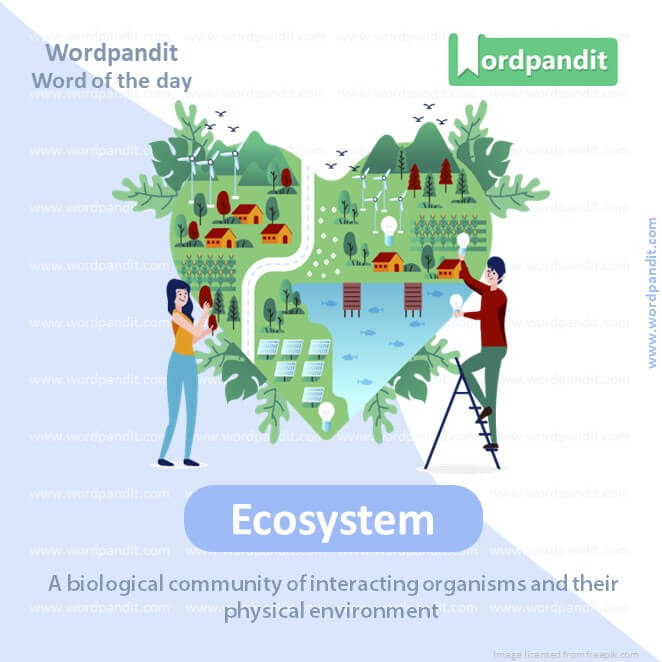
WORD-3: Ecosystem
CONTEXT: Climate change and human encroachment are posing significant threats to our Ecosystem. Scientists and environmentalists are working on strategies to counter these challenges.
SOURCE: Hindustan Times
EXPLANATORY PARAGRAPH: An ecosystem is like a big family where plants, animals, and everything around them live and work together. Each member of the family has a job, and they depend on each other.
MEANING: A biological community of interacting organisms and their
physical environment (noun).
PRONUNCIATION: Ee-co-sys-tem
SYNONYMS: Habitat, Environment, Setting, Surroundings, Sphere, Territory, Realm.
USAGE EXAMPLES:
1. The rainforest is a complex ecosystem with many species.
2. Pollution can damage the delicate balance of an ecosystem.
3. Oceans play a crucial role in the global ecosystem.
4. The desert ecosystem is tough for many plants and animals.
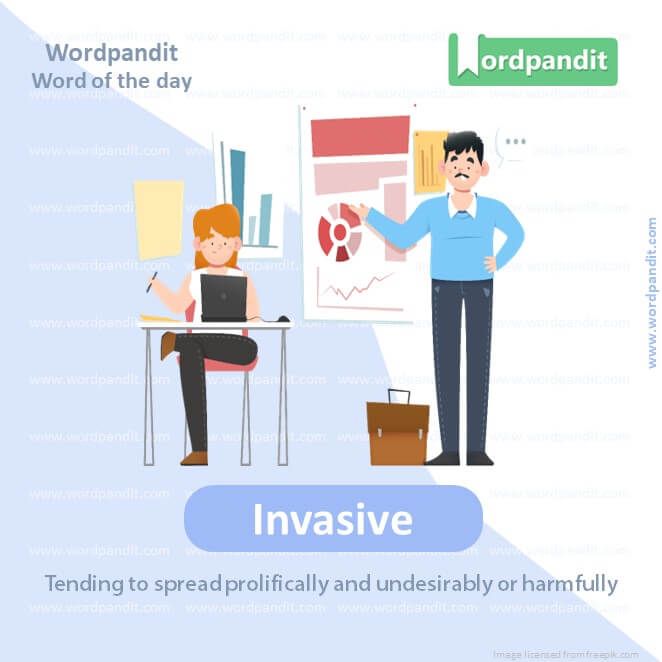
WORD-4: Invasive
CONTEXT: Invasive species, both flora and fauna, are posing serious threats to India’s biodiversity. These foreign species are outcompeting native species leading to an imbalance in the ecosystem.
SOURCE: Mint
EXPLANATORY PARAGRAPH: Imagine if a stranger walked into your room and started using your toys without asking. That’s kind of what invasive means. It’s when a plant, animal, or thing comes into a place where it doesn’t belong and causes problems.
MEANING: Tending to spread prolifically and undesirably or harmfully (adjective).
PRONUNCIATION: In-va-sive
SYNONYMS: Intrusive, Encroaching, Pervasive, Spreading, Aggressive, Expansive, Penetrating.
USAGE EXAMPLES:
1. The plant is considered invasive because it chokes out native species.
2. Invasive insects can harm crops.
3. The government is taking steps to control invasive species in the lake.
4. Invasive plants are altering the landscape.
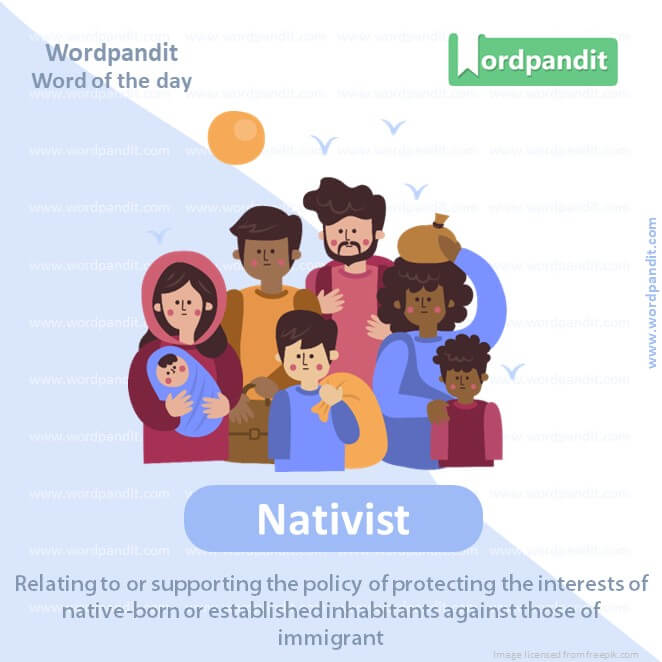
WORD-5: Nativist
CONTEXT: Nativist movements have gained traction in recent years, with more people advocating for the preservation and revival of local cultures, traditions, and languages.
SOURCE: Indian Express
EXPLANATORY PARAGRAPH: A nativist is someone who believes that people who were born in a place should be more important than those who moved there later.
MEANING: Relating to or supporting the policy of protecting the interests of native-born or established inhabitants against those of immigrant (noun).
PRONUNCIATION: Nay-ti-vist
SYNONYMS: Patriot, Nationalist, Xenophobe, Chauvinist, Partisan, Jingoist, Homebody.
USAGE EXAMPLES:
1. The nativist movement is growing in certain parts of the world.
2. He expressed nativist views during the debate.
3. The policies were seen as a nod to nativist sentiments.
4. Nativist attitudes can sometimes lead to exclusion.
WORD-6: Grumbled
CONTEXT: Residents grumbled about the poor management of waste in the city, saying local authorities have been neglectful. Several protests have been staged in different parts of the city.
SOURCE: The Times of India
EXPLANATORY PARAGRAPH: Have you ever been a little bit upset or annoyed about something and you mumbled or complained under your breath? That’s what “grumbled” means. It’s like a quiet way of showing you’re not happy about something.
MEANING: To complain about something in a low or quiet voice (verb).
PRONUNCIATION: Grum-bled
SYNONYMS: Mumbled, Murmured, Moaned, Whined, Grunted, Griped, Grouched.
USAGE EXAMPLES:
1. She grumbled about having to wake up early.
2. I could hear the workers grumbling about the new rules.
3. “Not again,” he grumbled when the phone rang.
4. They grumbled about the cold weather.
WORD-7: Preoccupations
CONTEXT: The preoccupations of the youth today are not just education and jobs but also issues like climate change, gender equality, and mental health awareness.
SOURCE: Hindustan Times
EXPLANATORY PARAGRAPH: Preoccupations are like big thoughts or worries that take up a lot of space in your brain. Imagine if you keep thinking about your favorite toy all day, and you can’t focus on anything else. That toy becomes your preoccupation.
MEANING: Things or matters that someone thinks about a lot or is very interested in (noun).
PRONUNCIATION: Pree-ock-yoo-pay-shuns
SYNONYMS: Concerns, Obsessions, Engrossments, Fixations, Worries, Fascinations, Interests.
USAGE EXAMPLES:
1. His main preoccupations were his family and his work.
2. The novel deals with the preoccupations of modern life.
3. Environmental issues are current preoccupations.
4. Her preoccupations kept her awake at night.
WORD-8: Enduring
CONTEXT: The enduring spirit of the Indian woman is exemplified in her ability to juggle multiple roles in society, managing both her professional aspirations and family responsibilities with grace.
SOURCE: Mint
EXPLANATORY PARAGRAPH: “Enduring” is like being strong and lasting a long time, even when things get tough. Imagine a toy that you play with a lot, and it still doesn’t break – that toy is enduring.
MEANING: Lasting for a long time or remaining unchanged (adjective).
PRONUNCIATION: En-dur-ing
SYNONYMS: Lasting, Permanent, Continuous, Persistent, Steadfast, Unchanging, Unfading.
USAGE EXAMPLES:
1. The pyramid is a symbol of enduring strength.
2. Their friendship has an enduring quality.
3. The book’s enduring popularity surprised many.
4. Enduring values are important in changing times.
WORD-9: Leitmotif
CONTEXT: The leitmotif of the government’s new policy changes is inclusive growth, aiming at benefiting all sections of the society.
SOURCE: The Economic Times
EXPLANATORY PARAGRAPH: Imagine a special song that plays every time your favorite superhero appears in a movie. That song helps you remember and recognize the superhero. In big words, we call that song a “leitmotif”.
MEANING: A recurring theme or idea in literature, music, or art (noun).
PRONUNCIATION: Lyte-moh-teef
SYNONYMS: Theme, Motif, Recurring idea, Refrain, Thread, Undercurrent, Subject.
USAGE EXAMPLES:
1. The movie used a leitmotif to signify the presence of the villain.
2. Love and loss became the leitmotif of her poetry.
3. The artist’s early works had a leitmotif of nature.
4. The leitmotif was evident throughout the symphony.
WORD-10: Scrutiny
CONTEXT: In light of recent scandals, the corporate sector is undergoing immense scrutiny, with demands for greater transparency in their operations.
SOURCE: Indian Express
EXPLANATORY PARAGRAPH: Imagine you are looking at a picture with a magnifying glass, trying to see every tiny detail. That’s kind of what “scrutiny” means. It’s when you look at something really closely or carefully.
MEANING: Close and careful examination or observation (noun).
PRONUNCIATION: Skroo-ti-nee
SYNONYMS: Examination, Inspection, Study, Investigation, Review, Analysis, Scan.
USAGE EXAMPLES:
1. The document is under strict scrutiny by the lawyers.
2. His actions came under public scrutiny.
3. Every detail of the plan was subjected to scrutiny.
4. Her performance will be under the scrutiny of the judges.
Vocabulary Definition
Understanding a language requires a deep grasp of the ‘vocabulary definition’. These precise meanings of words shape our understanding and communication. However, to successfully learn ‘vocabulary definition’, one must do more than just memorize a dictionary. So what’s the perfect approach to assimilating ‘vocabulary definition’?
The compelling answer is context. To truly comprehend ‘vocabulary definition’, expose yourself to diverse reading materials such as books, magazines, newspapers, and digital content. This approach equips you with a practical understanding of ‘vocabulary definition’ and illuminates the nuanced ways in which they get employed in conversation and writing.
An innovative way to enhance memory while learning ‘vocabulary definition’ involves visualization. By creating a mental image representing the definition, your brain can help cement the association between the word and its meaning, improving recall capability significantly.
Now, understanding and retaining ‘vocabulary definition’ is only one part of the equation. The other, equally essential part is application. Actively using these words in your personal conversations, professional communication, or social media posts will reinforce your understanding and usage of ‘vocabulary definition’.
Interactive language tools can be a great help when mastering ‘vocabulary definition’. Language-learning software and applications often provide comprehensive word definitions, examples, and even quizzes to test your learning progress.
In conclusion, the journey of embracing ‘vocabulary definition’ demands a blended approach. Diversified reading materials, visualization techniques, active application, and the leverage of modern language-learning tools together chart a pathway to mastering ‘vocabulary definition’. Remember, every word definition you conquer is a stepping stone leading you to the magnificent mansion of language proficiency. Happy learning!











